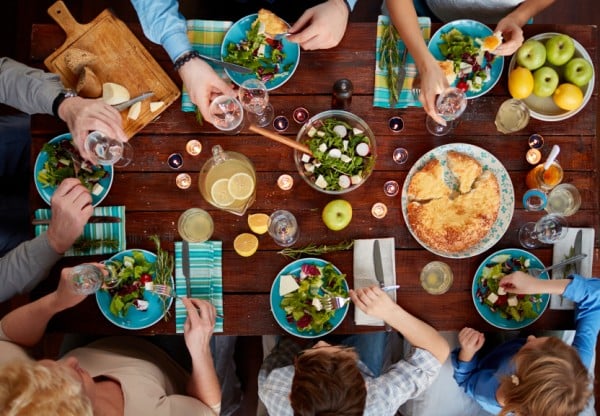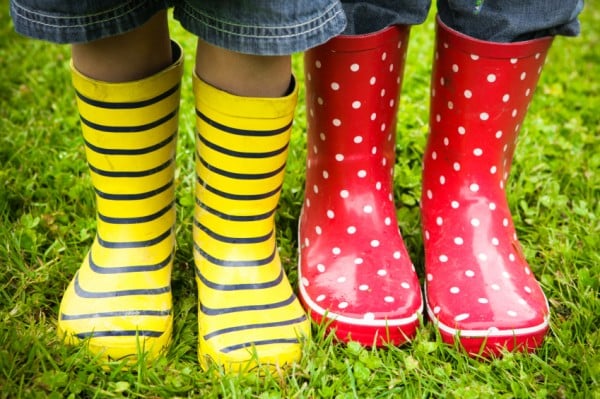
When it comes to kids, there is one number that’s the magic number for stress.
Mothers of three children stress more than mums of one or two, while mothers of four or more children actually report lower stress levels, according to a TODAYMoms.com survey of more than 7,000 U.S. mothers.
Call it the Duggar effect: Once you get a certain critical mass of kids, life seems to get a bit easier.

On a scale of 1-10, with 10 being the most stressed, the average mum in the survey puts herself at 8.5. What’s stressing mums out? Plenty, from money worries to balancing the demands of work and home to feeling like her husband is sometimes just another big kid demanding attention. But the big secret of mum stress is that a lot of it comes from within: 75 percent of mothers said they stress more about the pressure they put on themselves to be “perfect” than they do the pressure or judgment they get from other moms.
“You always hear about the mummy wars, but I feel like we’re judging ourselves more harshly than anyone else,” says Jill Smokler, 35, Scary Mommy blogger and author of Motherhood Comes Naturally (And Other Vicious Lies). And she should know from stress: She has three kids, and totally agrees that it’s the most stressful number.
“Going from one to two was an easy, breezy transition,” says Smokler, whose children are 5, 7 and 9. “Two to three, everything was turned upside down. I do not feel like I have it together. You only have two hands! Just crossing the street and not being able to physically hold all their hands I find tremendously stressful.”
More stress nuggets from the online survey of 7,164 mothers:
- 46 percent of mums say their husbands/partners cause them more stress than their kids do.
- 72 percent of mums stress about how stressed they are.
- Biggest cause of stress: 60 percent say it’s lack of time to do everything that needs to get done.
- 60 percent of mums say raising girls is more stressful than raising boys.
- Nine out of 10 mums stress about staying fit and attractive.
Dr. Janet Taylor, a psychiatrist in New York, said mum stress is a problem she sees daily in her practice.
“Mums are acutely aware of the fact they do not have the time to take care of their own needs,” Taylor said. Forget reading a book, exercising or fun hobbies: Some mums barely have time to shower.
“Before you’re a mum, you take that for granted,” Taylor said. “When you are a mum you just don’t have the time.”
She laughed when she heard that having four or more kids was less stressful than three. She’s a mother of four, including a set of twins – and agrees with the survey findings.

“There’s just not enough space in your head” for perfectionism when you get to four or more kids, Taylor said. For example, she recalls with her fourth child she didn’t bother with things like obsessively covering all the outlets with safety plugs. “It just gets to be survival!” she joked. Plus, she thinks mums hit a groove once they get past the outnumbered phase of having three kids and into the seriously outnumbered territory of four or more.
“The more children you have, the more confident you become in your parenting abilities,” Taylor said. “You have to let go… and then you’re just thankful when they all get to school on time.”
Taylor’s children now range in age from 19 to 25, and while she says the stress differs from the hands-on parenting years, it always remains. “Now I get stressed out by things like, my oldest has a job interview and my youngest is in the middle of finals,” she said. “I’m on the other side… hopefully you can feel like you’ve prepared them well.”
A daily stress level of 8.5 on a scale of 10, the average that mums in the survey report, takes a toll on mind and body, Taylor said. She recommends her stressed-out patients try this exercise: Take five minutes and draw a pie chart showing how you actually spend the hours in your day. Then flip the paper over and draw a pie chart of what you’d like to be doing. Pick one of the things that’s on chart two (what you want), but not chart one (the reality), and figure out a way to make it happen.
This is how you get ready for Christmas with the Duggars: 19 Kids and Counting... (post continues after the video).
“You have to be able to say no to your kids, to your spouse, to your friends sometimes,” Taylor said, explaining that many women find that part really hard. “Instead of making the perfect lunch for your kids, go for a walk by yourself. Even if it’s just 10 minutes, take some deep breaths and focus on what you need.”
Karen Hobert Flynn, 50, said saying "no" to some kids’ activities is one sanity-saver as a mum of many. Her four boys now range in age from 11 to 16, and she and her husband both work in demanding jobs – he as an attorney, she for the grassroots lobbying group Common Cause, which often requires her to travel. Her rule has always been: One after-school activity per child.
“You can do Boy Scouts or a sport. We didn’t do five sports. We said ‘no’ to intense travel teams,” she explained. And she said it didn’t limit her boys; they’re all playing competitive team sports at school now.
Having four has its advantages, she said. Each child has a built-in playmate; they tend to pair up so no one is left out. And her backyard is always full of kids, even though they have far from the fanciest swingset in the neighborhood.

“We have a critical mass. Kids in the neighborhood would want to come here because it’s an immediate party,” she said.
For her and her husband, going from one child to two was a big adjustment; transitioning from two to three, “you’re outnumbered,” and adding a fourth child was “not as big a jump.”
She says she keeps stress at bay by staying organised, connecting with other mums, cultivating good babysitters, relying on her husband – and of course, not taking life too seriously, even in the midst of teenage drama.
“We laugh a lot,” Flynn said. “It’s a lot of fun.”
How many kids do you have and on a scale of 1 (no stress) to 10 (stressed), how would you rate yourself?
Want more? Try:
The results are in. And the perfect age gap between siblings is…
